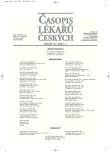Aristoteles Redivivus or Small Repetitorium of Aristotelian Methodology Regarding Problems of Psychosomatic Medicine
Aristoteles redivivus aneb Malé repetitorium aristotelské metodologie s ohledem na problematiku psychosomatické medicíny
Současná biologická medicína se dosud nevyrovnala s novověkým dědictvím mechanistického pojetí kauzality, které v mnoha směrech výrazně omezuje diagnostické i terapeutické schopnosti dnešních lékařů. Pokud takto redukovaný princip kauzality konfrontujeme s Aristotelovou koncepcí čtyř druhů příčin a s možnostmi jejich využití při zkoumání živé přírody (tedy i v lékařství), dojdeme k jistým netriviálním rozdílům, které mohou být pro dnešního lékaře přinejmenším inspirativní. V podobné pozici, ze které již Aristotelés kritizoval své předchůdce za nedostatečné vysvětlení principu příčiny a následku, se nachází i současný psychosomaticky myslící lékař. Ten má s Aristotelem – jak se snažíme ukázat – mnoho společného, a proto lze s jistou nadsázkou mluvit o „znovuoživení“ Aristotela v některých nových trendech současné medicíny, které dosud převažující mechanistickou mentalitu nahrazují myšlením ekosystémovým.
Klíčová slova:
Aristoteles, kauzalita, psychosomatika.
Authors:
H. Bartoš; J. Šavlík 1
Authors‘ workplace:
Fakulta humanitních studií UK, Praha
; Psychosomatická poradna psychoterapeutické oddělení H. Palata Fakultní poliklinika VFN, Praha
1
Published in:
Čas. Lék. čes. 2006; 145: 288-294
Category:
Review Article
Overview
Present-day biological medicine has not reconciled the modern heritage of mechanistic conception of causality, which in many aspects limits the diagnostic and therapeutic potential of contemporary physicians. If such reduced principle of causality is confronted with Aristotelian conception of four types of disease causes and with the possibility to use it in the study of life nature (and therefore also in medicine), non-trivial differences will be revealed, which can at least bring some inspiration to present day physicians. The contemporary psychosomatically thinking physicians are in a similar position from which Aristotle criticized his foregoers for insufficient explanation of the principle of cause and effect. Medical doctors have many common points with Aristotle and that is why it is possible to speak, with certain hyperbole, about renewal of Aristotelian conceptions in some of the new trends of contemporary medicine, where the present-day mechanistic mentality is replaced with ecosystematic thinking.
Key words:
Aristoteles, causality, psychosomatics.
Labels
Addictology Allergology and clinical immunology Angiology Audiology Clinical biochemistry Dermatology & STDs Paediatric gastroenterology Paediatric surgery Paediatric cardiology Paediatric neurology Paediatric ENT Paediatric psychiatry Paediatric rheumatology Diabetology Pharmacy Vascular surgery Pain management Dental HygienistArticle was published in
Journal of Czech Physicians

- Possibilities of Using Metamizole in the Treatment of Acute Primary Headaches
- Metamizole at a Glance and in Practice – Effective Non-Opioid Analgesic for All Ages
- Advances in the Treatment of Myasthenia Gravis on the Horizon
- Metamizole vs. Tramadol in Postoperative Analgesia
- Spasmolytic Effect of Metamizole
-
All articles in this issue
- Therapy of Patients with Heart Failure – Do we Owe Anything to Our Patients?
- Long-lasting Cardiostimulation in the Treatment of Heart Failure
- Contemporary Prospects for the Diagnostics and Treatment of the Chronic Pulmonary Hypertension
- Current Approach to the Diagnostics and Therapy of Acute Coronary Syndromes
- Role of Doppler Echocardiography in the Diagnostics and Therapy of Hypertrophic Cardiomyopathy
- Mortality Downtrend Stopped During Previous Years
- Aristoteles Redivivus or Small Repetitorium of Aristotelian Methodology Regarding Problems of Psychosomatic Medicine
- Chance for Patients with Rare Diseases – „Orphan” Medicinal Products
- EBV Quantification in Children Undergoing Allogeneic Hematopoietic Stem Cell Transplantation
- Pulmonary Endarterectomy – The Surgical Treatment of Chronic Thromboembolic Pulmonary Hypertension
- Paternal Smoking and Exposure of Pre-school Children to Tobacco Smoke
- Methylene Blue in the Therapy of Vasoplegic Syndrome after Cardiac Surgery Procedure
- Larva migrans cutanea
- Purkynje Fibers of the Heart Conduction System – History and the Present Time
- Journal of Czech Physicians
- Journal archive
- Current issue
- About the journal
Most read in this issue
- Purkynje Fibers of the Heart Conduction System – History and the Present Time
- Larva migrans cutanea
- Pulmonary Endarterectomy – The Surgical Treatment of Chronic Thromboembolic Pulmonary Hypertension
- Long-lasting Cardiostimulation in the Treatment of Heart Failure
